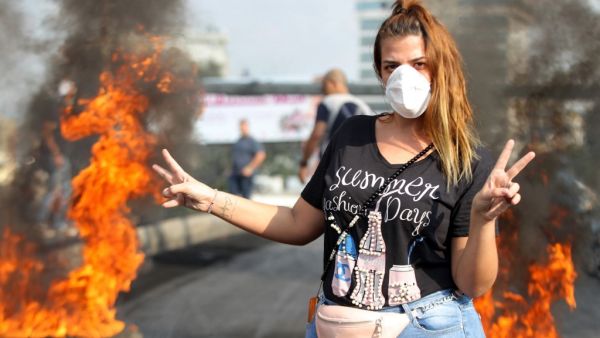For the fourth day, hundreds of people began to gather in the country’s major cities, with the biggest demonstration set to be held in Beirut’s Riad al-Solh at noon.
After a night of carnival-like protest, tents were set up in Riad al-Solh facing the government’s headquarters, the Grand Serail. Sunday morning, protesters gathered trash, sorted it, and put it in different colored bags.
“We are sorting, can you see that [Fadi] Jreissati?” one protester said, referring to the environment minister’s plans to help solve the nation’s ongoing garbage disposal problems.
The protesters collected dozens of trash bags. For its part, the state dispatched bulldozers to remove debris from the capital’s streets.
In Tripoli and Batroun, in north Lebanon; Tyre, in south Lebanon; Deir al-Qamar, in Mount Lebanon, and many other towns, thousands took to the streets. Buses also took protesters from Bekaa to Beirut to join the Riad al-Solh protest.
{"preview_thumbnail":"https://cdn.flowplayer.com/6684a05f-6468-4ecd-87d5-a748773282a3/i/v-i-3…","video_id":"35294c0e-bfcd-4513-bf26-16fcb26b88e1","player_id":"8ca46225-42a2-4245-9c20-7850ae937431","provider":"flowplayer","video":"Lebanon's 'Strong Republic' Bloc Quits the Coalition Govt"}
Nationwide demonstrations broke out Thursday after Cabinet ministers announced the imposition of new and increased taxes, in a bid to increase state revenues. The measures included a $0.20 daily fee on internet voice calls using applications such as WhatsApp, which many refer to as the “straw that broke the camel’s back.”
Calls on the government to resign and political leaders to step down echoed across the nation.
Prime Minister Saad Hariri Friday gave 72 hours for political parties to discuss ways to implement reforms to salvage the situation.
Lebanese Forces announced Saturday night that its four ministers would resign from Hariri’s Cabinet.
This article has been adapted from its original source.








